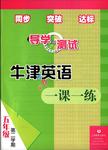题目内容
10. If you want to keep fit,you . (have to)
想保持健康,你没必要只吃水果。
10. don't have to eat fruit only

练习册系列答案
 唐印文化课时测评系列答案
唐印文化课时测评系列答案 导学与测试系列答案
导学与测试系列答案
相关题目
题目内容
10. If you want to keep fit,you . (have to)
想保持健康,你没必要只吃水果。
10. don't have to eat fruit only

 唐印文化课时测评系列答案
唐印文化课时测评系列答案 导学与测试系列答案
导学与测试系列答案